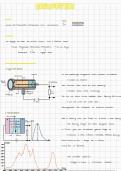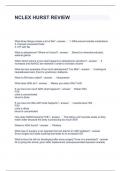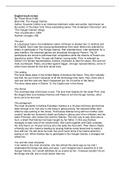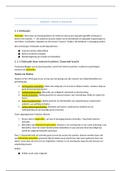POLITICAL SCIENCE
COURSE 222
WEEK 1:
Introduction to GPE as a discipline:
Emerged in in 1970s while Cold War was taking place
Looking at purely political or purely economic perspective wasn’t enough and there
needed to be more or an interdisciplinary approach to look at events which were
happening around the world
Discipline of international political economy:
o Emerged in mid 70s
o Focused on state
o International relations
o International political economy
o Discipline emerged in 70s, focus on State as most important unit of analysis
that scholars studied
• Towards 80s when world became more globalized
o Especially after fall of Berlin Wall in in 1989 which signaled end of Cold War
o World became more interconnected and new actors came to rise
o New companies in terms of their wealth exceed the wealth of small nation
states
o Therefore, perhaps shouldn’t only look at states when studying GPE but also
other market actors like transnational corporations and NGOs • GPE because State is not the only
thing, we study
o There are only important actors
IPE is a subfield of IR
IR has departments which focusses on political economy
What led to the creation to GPE?
o Arab oil embargo which led to;
Notes made by Taaha Azzakani (26280353) and may not be sold by anyone else but himself.
,o The Nixon surprise or Nixon Shock • Arab oil embargo
o Oil embargo on US and Netherlands
o Great shortage of oil in Western Europe and US therefore prices went up
Inflation rates
Nixon instituted ceased conversion US dollar to gold
Discipline had to be widened to include economic and transnational issues
Interdisciplinary issues
“The whole point of studying IPE rather than IR is to extend more widely
the
conventional limits of the study of politics...” – Susan Strange
All about power and the state but increasingly, after the fall of the Berlin Wall, scholars
realized they needed to have a look at other frameworks in order to realize why there
is an interconnectedness
IR/Politics: focus is on power
o Power as the ability to produce intended effects
o Tends to ignore wealth as power
o Wealthiest states in the world control things such as the UN
Have more decision-making power, more power to get other states to
align with them to vote with them on their issues • Economics: Scarcity, distribution, consumption
o Tends to ignore power as determining economic decisions
o Look at US-China trade war (coming at the end of this chapter note)
Tariffs • GPE: Wealth as power
o Disparities in wealth between nations o Marxism is an important theory here
Political structures ⟺ economic interactions
“[IPE is] the set of international and global problems that cannot usefully be understood or
analysed as just international politics or just international economics” – Michael Veseth
“Since most economic questions are notoriously political, and almost all
political
questions involve some economic considerations, one cannot describe issues any
more as ‘purely economic’ or as ‘purely political’. Both are both.” – Susan
Strange
Notes made by Taaha Azzakani (26280353) and may not be sold by anyone else but himself.
, The State: IPE challenges IR notions of states and power by suggesting that states can
lose power to, for example, market actors
The Market: efficiency vs. power
o Doesn’t totally regulate itself
• Society: what role does society and its values and beliefs play?
o Communist society in china
o How do those norms or beliefs regulate or state or market?
o What is the role of beliefs under Margaret Thatcher and Ronald Reagan’s
administrations where they believed the state had no business in the market
Impact of transnational corporations (production, global division of labour, gender,
the environment)
International finance (Global Financial Crisis 2007-2009)
International trade (trade wars between the U.S. and China)
Development & North-South relations
Interdependence & globalisation?? (Brexit, election of Donald Trump, xenophobic
violence in SA)
COVID-19
The Asian Financial Crisis
Why the Asian financial crisis example is important:
It demonstrates that the same event can be analysed in several different ways
Most major developments are interpreted through competing explanations
Facts do not exist independently of explanatory frameworks
Facts are pieces of information that are thought to correspond to reality and be true,
but the way in which they are perceived and judged is influenced by theory
• In order to make sense of the world and to enable us to take constructive action, humans develop
theories to help determine which facts are most important and what significant relationships there
are between different events
Notes made by Taaha Azzakani (26280353) and may not be sold by anyone else but himself.
, WEEK 2:
The same subject can be examined in different disciplines from a variety of perspectives
Theories explains, describe and predict (glasses with different lenses)
Different theories have different basic assumptions about:
o A) the units of analysis
o B) the nature of the system
o C) the motivation of the actors (they are thus incompatible)
We choose theories for their specific utility – “Theory is always for someone and some
purpose” – Robert Cox
Social location of observer is important
1. Economic nationalism/ mercantilism
• Role of the state and the importance of power in shaping outcomes in i.p.e
2. Liberalism
• Emphasis on the individual and non-state actors; co-operation → peace; importance of
economy, non-interference in market 3. Critical theories
Question the way the world is organised
Challenge structures of power
Propose how the world could and should change to make it more equitable
Examples:
i. ii. iii. iv. v.
• Tracks realism
o State as main unit of analysis – 1648 o Statism, self-help and survival
• Limited amount of wealth
Marxism (Class)
Feminism (Gender)
Ecologism/ Green Theory (Environment) Postcolonialism (Legacy of imperialism) Poststructuralism (Language
and culture)
Economic Nationalism
o Zero sum game
Gilpin: “The attempt of governments to manipulate economic arrangements in
order to
maximise their own interests, whether or not this is at the expense of others”
Struggle for power and wealth in anarchic international; system (conflict)
Balance of power
Classic mercantilism: wealth and power through unequal foreign trade (favours those with
Notes made by Taaha Azzakani (26280353) and may not be sold by anyone else but himself.
COURSE 222
WEEK 1:
Introduction to GPE as a discipline:
Emerged in in 1970s while Cold War was taking place
Looking at purely political or purely economic perspective wasn’t enough and there
needed to be more or an interdisciplinary approach to look at events which were
happening around the world
Discipline of international political economy:
o Emerged in mid 70s
o Focused on state
o International relations
o International political economy
o Discipline emerged in 70s, focus on State as most important unit of analysis
that scholars studied
• Towards 80s when world became more globalized
o Especially after fall of Berlin Wall in in 1989 which signaled end of Cold War
o World became more interconnected and new actors came to rise
o New companies in terms of their wealth exceed the wealth of small nation
states
o Therefore, perhaps shouldn’t only look at states when studying GPE but also
other market actors like transnational corporations and NGOs • GPE because State is not the only
thing, we study
o There are only important actors
IPE is a subfield of IR
IR has departments which focusses on political economy
What led to the creation to GPE?
o Arab oil embargo which led to;
Notes made by Taaha Azzakani (26280353) and may not be sold by anyone else but himself.
,o The Nixon surprise or Nixon Shock • Arab oil embargo
o Oil embargo on US and Netherlands
o Great shortage of oil in Western Europe and US therefore prices went up
Inflation rates
Nixon instituted ceased conversion US dollar to gold
Discipline had to be widened to include economic and transnational issues
Interdisciplinary issues
“The whole point of studying IPE rather than IR is to extend more widely
the
conventional limits of the study of politics...” – Susan Strange
All about power and the state but increasingly, after the fall of the Berlin Wall, scholars
realized they needed to have a look at other frameworks in order to realize why there
is an interconnectedness
IR/Politics: focus is on power
o Power as the ability to produce intended effects
o Tends to ignore wealth as power
o Wealthiest states in the world control things such as the UN
Have more decision-making power, more power to get other states to
align with them to vote with them on their issues • Economics: Scarcity, distribution, consumption
o Tends to ignore power as determining economic decisions
o Look at US-China trade war (coming at the end of this chapter note)
Tariffs • GPE: Wealth as power
o Disparities in wealth between nations o Marxism is an important theory here
Political structures ⟺ economic interactions
“[IPE is] the set of international and global problems that cannot usefully be understood or
analysed as just international politics or just international economics” – Michael Veseth
“Since most economic questions are notoriously political, and almost all
political
questions involve some economic considerations, one cannot describe issues any
more as ‘purely economic’ or as ‘purely political’. Both are both.” – Susan
Strange
Notes made by Taaha Azzakani (26280353) and may not be sold by anyone else but himself.
, The State: IPE challenges IR notions of states and power by suggesting that states can
lose power to, for example, market actors
The Market: efficiency vs. power
o Doesn’t totally regulate itself
• Society: what role does society and its values and beliefs play?
o Communist society in china
o How do those norms or beliefs regulate or state or market?
o What is the role of beliefs under Margaret Thatcher and Ronald Reagan’s
administrations where they believed the state had no business in the market
Impact of transnational corporations (production, global division of labour, gender,
the environment)
International finance (Global Financial Crisis 2007-2009)
International trade (trade wars between the U.S. and China)
Development & North-South relations
Interdependence & globalisation?? (Brexit, election of Donald Trump, xenophobic
violence in SA)
COVID-19
The Asian Financial Crisis
Why the Asian financial crisis example is important:
It demonstrates that the same event can be analysed in several different ways
Most major developments are interpreted through competing explanations
Facts do not exist independently of explanatory frameworks
Facts are pieces of information that are thought to correspond to reality and be true,
but the way in which they are perceived and judged is influenced by theory
• In order to make sense of the world and to enable us to take constructive action, humans develop
theories to help determine which facts are most important and what significant relationships there
are between different events
Notes made by Taaha Azzakani (26280353) and may not be sold by anyone else but himself.
, WEEK 2:
The same subject can be examined in different disciplines from a variety of perspectives
Theories explains, describe and predict (glasses with different lenses)
Different theories have different basic assumptions about:
o A) the units of analysis
o B) the nature of the system
o C) the motivation of the actors (they are thus incompatible)
We choose theories for their specific utility – “Theory is always for someone and some
purpose” – Robert Cox
Social location of observer is important
1. Economic nationalism/ mercantilism
• Role of the state and the importance of power in shaping outcomes in i.p.e
2. Liberalism
• Emphasis on the individual and non-state actors; co-operation → peace; importance of
economy, non-interference in market 3. Critical theories
Question the way the world is organised
Challenge structures of power
Propose how the world could and should change to make it more equitable
Examples:
i. ii. iii. iv. v.
• Tracks realism
o State as main unit of analysis – 1648 o Statism, self-help and survival
• Limited amount of wealth
Marxism (Class)
Feminism (Gender)
Ecologism/ Green Theory (Environment) Postcolonialism (Legacy of imperialism) Poststructuralism (Language
and culture)
Economic Nationalism
o Zero sum game
Gilpin: “The attempt of governments to manipulate economic arrangements in
order to
maximise their own interests, whether or not this is at the expense of others”
Struggle for power and wealth in anarchic international; system (conflict)
Balance of power
Classic mercantilism: wealth and power through unequal foreign trade (favours those with
Notes made by Taaha Azzakani (26280353) and may not be sold by anyone else but himself.










